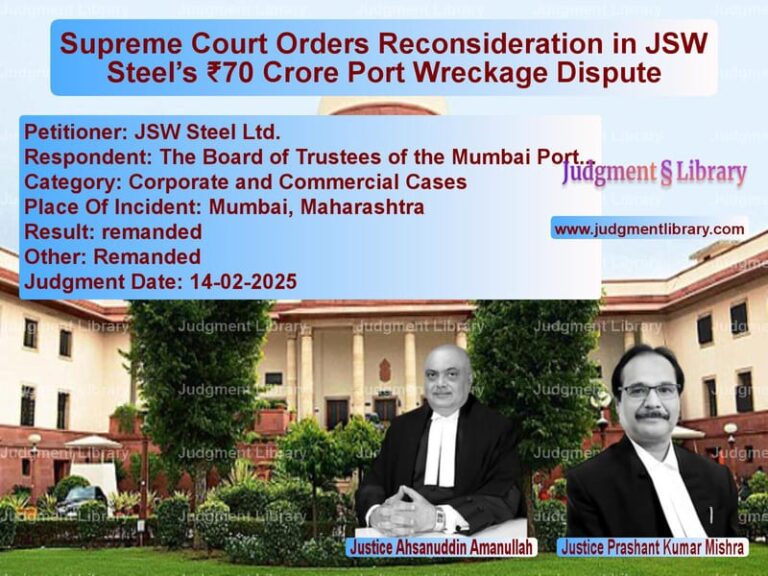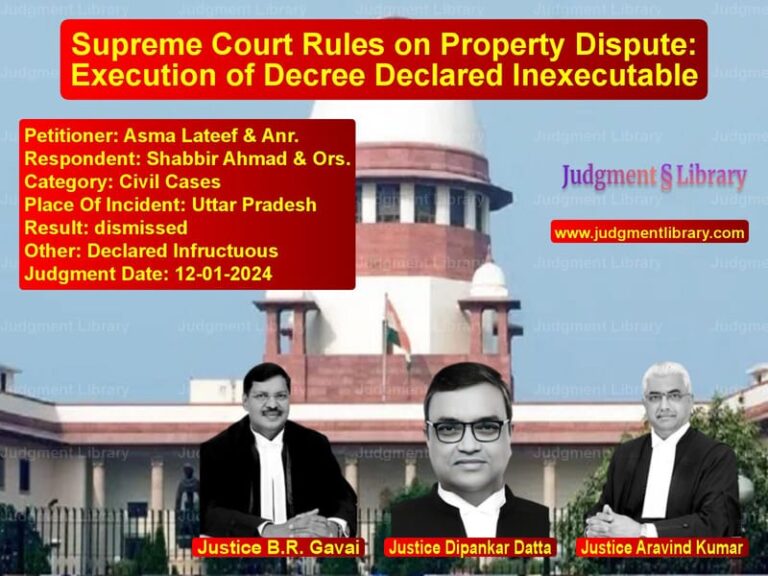Bihar Accounts Clerks Entitled to ACP Benefits: Supreme Court Overrules High Court Decision
The Supreme Court of India, in the case of Amresh Kumar Sinha & Others v. The State of Bihar & Others, ruled in favor of government employees seeking Assured Career Progression (ACP) benefits. The Court held that government clerks in Bihar are entitled to ACP benefits even if they do not meet the educational qualifications prescribed for promotion. This landmark decision ensures financial relief for stagnated employees who do not get timely promotions.
Background of the Case
The appellants in this case were Accounts Clerks in Bihar. They were appointed when the minimum qualification was an Intermediate (Class 12) pass. Initially, Bihar had two separate cadres—Junior Accounts Clerk and Senior Accounts Clerk. In 1980, both cadres were merged to form a common Accounts Clerk cadre. However, in 1999, the cadre was split again, leaving clerks without clear promotional avenues.
The appellants filed a writ petition before the Patna High Court, arguing that they should be granted benefits under the ACP Scheme, which ensures financial upgradation for employees stuck in the same position without promotion.
High Court’s Ruling
The Single Judge Bench of the Patna High Court ruled in favor of the appellants, granting them ACP benefits. However, the Bihar government appealed, and the Division Bench of the High Court overturned the decision, stating that ACP benefits require the same educational qualifications as promotion. Since the appellants were not graduates, the High Court ruled that they were ineligible.
Petitioner’s Arguments
The appellants argued:
- ACP is not a promotion but a financial relief to avoid stagnation.
- Accounts Clerks had no clear promotional path, making ACP benefits essential for career growth.
- The Bihar State Employees Service Condition (ACP) Rules, 2003, provide that ACP is intended to compensate employees who are denied promotions for no fault of their own.
- Educational qualifications should only apply to actual promotions, not to ACP benefits.
Respondent’s Arguments
The Bihar government, represented by its counsel, contended:
- As per Bihar Accounts Service Rules, graduation is mandatory for promotion to the post of Accounts Officer.
- ACP benefits are based on promotional criteria; hence, non-graduates cannot claim them.
- The state’s financial burden would increase if ACP benefits were extended to all employees.
Key Legal Issues
The Supreme Court considered:
- Is graduation a mandatory qualification for ACP benefits?
- Can ACP benefits be denied if an employee is ineligible for promotion?
- Does denying ACP benefits violate the purpose of the scheme?
Supreme Court’s Observations
The Supreme Court ruled in favor of the appellants, stating:
- “ACP is a scheme to avoid stagnation, not a promotion. Denying financial benefits to clerks based on qualifications meant for promotions is unjustified.”
- “The scheme provides financial relief for employees who have completed 12 years of service. This does not require additional qualifications.”
- “Educational qualifications apply to actual promotions, but ACP benefits are financial in nature and do not change an employee’s role.”
- “If the state denies ACP benefits based on qualifications, it defeats the very purpose of the scheme.”
The Court referenced several precedents:
- Union of India v. G. Ranjanna (2008) – Held that ACP is not a promotion but a financial benefit.
- Union of India v. C.R. Madhava Murthy (2022) – Reinforced that ACP aims to prevent stagnation.
Final Judgment
The Supreme Court allowed the appeals and restored the Single Judge’s order, granting ACP benefits to the appellants. The ruling stated:
“The appellants are entitled to financial upgradation under the ACP Scheme, irrespective of their educational qualifications. Denying benefits based on graduation requirements frustrates the purpose of the scheme.”
Read also: https://judgmentlibrary.com/annual-increment-on-retirement-supreme-court-upholds-employee-rights/
Legal Impact and Significance
- Ensures financial relief for stagnated employees.
- Clarifies that ACP is not a promotion and should not be subject to promotional qualifications.
- Sets a precedent for employees in other states facing similar issues.
Conclusion
The Supreme Court’s decision in Amresh Kumar Sinha v. State of Bihar strengthens the rights of government employees, ensuring that ACP benefits are granted fairly. By ruling that ACP does not require additional qualifications, the Court upheld the fundamental principle that employees should not suffer financially due to a lack of promotional opportunities. This judgment serves as a crucial precedent for similar disputes across India.
Petitioner Name: Amresh Kumar Sinha & Others.Respondent Name: The State of Bihar & Others.Judgment By: Justice B.R. Gavai, Justice Pankaj Mithal.Place Of Incident: Bihar.Judgment Date: 25-04-2023.
Don’t miss out on the full details! Download the complete judgment in PDF format below and gain valuable insights instantly!
Download Judgment: amresh-kumar-sinha-&-vs-the-state-of-bihar-&-supreme-court-of-india-judgment-dated-25-04-2023.pdf
Directly Download Judgment: Directly download this Judgment
See all petitions in Pension and Gratuity
See all petitions in Employment Disputes
See all petitions in Public Sector Employees
See all petitions in Judgment by B R Gavai
See all petitions in Judgment by Pankaj Mithal
See all petitions in allowed
See all petitions in supreme court of India judgments April 2023
See all petitions in 2023 judgments
See all posts in Service Matters Category
See all allowed petitions in Service Matters Category
See all Dismissed petitions in Service Matters Category
See all partially allowed petitions in Service Matters Category







